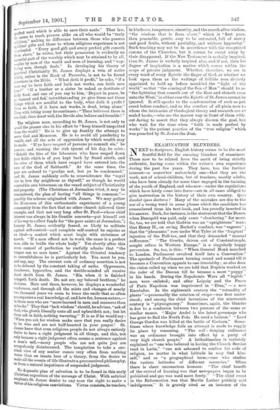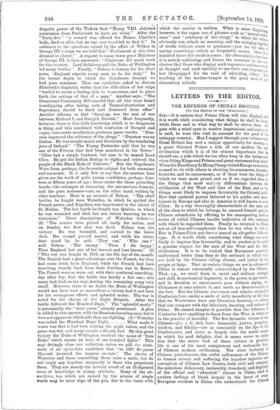EXAMINATION BLUNDERS.
NEXT to Scripture, English history seems to be the most fruitful field for the amusing blunders of examinees Those now to be related have the merit of being strictly authentic, having come within the writer's own experience during the past few years. They have, too, the further interest—a somewhat melancholy one—that they are the work, not of school-children, but of teachers, mostly adults, who have been already for some time engaged in the training of the youth of England, and who now—under the regulations which have lately come into force—are in all cases obliged to give instruction in the history of their own country. Quid docebit ipsos doctores ? Many of the mistakes are due to the use of a wrong word in some phrase which the candidate has remembered from his text-book, and has proudly inserted in his answer. Such, for instance, is the statement that the Danes, when Danegeld was paid, only came "clambering" for more. So, too, we are told that Godwin was an " uprighteous " man ; that Henry II., on seeing Becket's conduct, was " rageous " ; that the "pheasants" rose under Wat Tyler at the "fragrant" injustice of the Poll-tax, and that they demanded "manual sufferance." "The Greeks, driven out of Constantinople, sought refuse in Western Europe," is a singularly happy perversion. So, too, is this: "When General Monk marched to London, Parliament revolved itself into a Convention." The spectacle of Parliament turning round and round till it becomes a Convention appeals to one irresistiby ; so also does the vision called up when we are told that Dupleix worked on the ruler of the Deccan till he became a mere " puppy " in his bands. During the Napoleonic Wars all " legible " men were enlisted ; and after Leipzig and the Peace of Paris Napoleon was imprisoned in "Etna," — a new Enceladus. In the eighteenth century the "rotundity of plants "—presumably the rotation of crops—was first under- stood ; and among the chief inventions of the nineteenth century is "physiognomy." Sometimes, again, the blunder is due to a confusion between two persons of the same or similar names. "Major Andre is the latest personage who has gone to find the North Pole. He used a balloon." "Lord George Gordon was killed at the battle of Cartoon." Some- times where knowledge fails an attempt is made to supply its place by reasoning. "The self - denying ordinance was an ordinance brought into effect by a party of very high church people." A latitudinarian is variously explained as "one who believed in having the Church Service read in Latin," "one not ashamed to confess his code a religion, no matter in what latitude he may find him- self," and as "a geographical term,—one who studies the various latitudes of different countries." Often there is sheer unconscious humour. "The chief benefit of the revival of learning was that newspapers beg-an to be published and gas was used more freely." "The chief event in the Reformation was that Martin Luther publicly sold indulgences." It is gravely cited as an instance of the despotic power of the Tudors that "Henry VIII. obtained Permission from Parliament to have six wives." After .the' " rOrty-five " "a reward was offered for Prince Charlie's "body, dead or alive, but no one ever troubled to find it.". In reference to the questions raised by the affair of Wilkes in George III.'s reign we are told that "Parliament at this time debated in silence." A request to name three great Ministers of George III. is thus answered : "Gladstone did much work for the country. Lord.Salisbury and the Duke of Wellington led many battles." Finally, "Nelson is famous for his short poem England expects every man to do his duty.' " In the lowest depth to which the blunderers descend we find pure nonsense. Thus one candidate, asked to discuss Elizabeth's duplicity, writes that the difficulties of her reign "tended to create a feeling akin to womanness, and to place forth the actions of that of a man." Another says : "The Occasional Conformity Bill exacted that all who were found worshipping after taking oath of Transubstantiation and Supremacy should be fined and dismissed from office." Another informs us that "Saratoga was the seat of war between Richard I. and Surajah Dowlah." Most frequently, however, there is that little knowledge which is so dangerous a thing, and this combined with confusion of thought and vague, inaccurate recollection produces queer results. "Dun- stan improved the celebracy of the clergy." "Dunstan was an Italian. He was taught music and literature by the wandering jews of Ireland." "The Young Pretender said that he was one of the Princes that bad been murdered in the Tower." "Clive had a simple boyhood, but rose to be named Lord Clive. He put the Indian Mutiny to rights and relieved the people of the Black Hole of Calcutta." But the Napoleonic Wars form, perhaps, the favourite subject for both examiner and examinee. It is only fair to say that the answers here given are the work of quite young candidates, perhaps four- teen or fifteen years of age ; those under the three preceding heads—the attempts at reasoning, the unconscious humour, and the pure nonsense—are, on the other hand, written by older teachers. Here is an account of Nelson. "The chief battles he fought were Waterloo, in which he spoiled the French power, and Napoleon was imprisoned in the island of St. Helena. The last battle he fought was Quebec, in which he was wounded and died, but not before knowing he was victorious." Three descriptions of Waterloo follow :— (1) "The armies were placed all ready for action, and on Sunday the first shot was fired. Nelson won the victory. He was wounded, and carried to the lower deck. His wound proved mortal, and while his atten- dant stood by, he said, They run." Who run ? '
said Nelson. The enemy." Then I die happy.' Thus England lost one of her bravest and best heroes." (2) "This war was fought in 1815, on the 8th day of the month.
• The English had a great advantage over the French, for they bad come fresh from England, while the French had been marching wearily back from their fruitless war in Russia. The French were so worn out with their continual marching, day after day, that the battle was hardly a fair one ; also many had died on the way, leaving the remaining army very small. However, there is no doubt the Duke of Wellington would not have won so marvellous a victory had it not been for his courageous efforts and splendid motto. The war is noted for the charge of the Light Brigade. After the battle followed the Hundred Days." The "splendid motto" is presumably the "short poem" already mentioned. A plan is added to this answer, with the Russians hovering near; but it
does not appear on which side they are fighting (3) " Waterloo was called the Hundred Days' Fight What made it
worse was that it had been raining the night before, and the grass was wet, and many caught, cold and died. By this great victory the Duke of Wellington received the name of 'Iron Duke,' which means an hero of one hundred fights." This may fittingly close our collection, unless we add the state. ment of an up-to-date candidate that "in 1897 Se.g,neur Macroni invented the famous ex-rays." The stories of Waterloo and those resembling them raise a smile, but do not imply any hopeless incapacity in those who perpetrate them. They are merely the natural result of an ill-digested mass of knowledge in young students. Many of the ab- surdities, too, which are caused by the misuse of single wards may be mere slips Of the pen, due to the haste with which the answer is written. What is more discinittv however, is the vague use of phrases such as "n atter' ance " and " celebracy of the clergy," to which the injoe,, obviously can attach no meaning, and the stringing together of words without sense or grammar—just for the sake of saying something—which so frequently occurs. Once in a hundred times the result is comic; the other ninety-nine tinsel it is merely saddening, and forces the examiner to the eo elusion that those who display such vagueness and inaeow..„, of thought and such inability to use their own language „.e but ill-equipped for the task of educating others. The teaching of the mother-tongue is the great need of on? elementary schools.







































 Previous page
Previous page